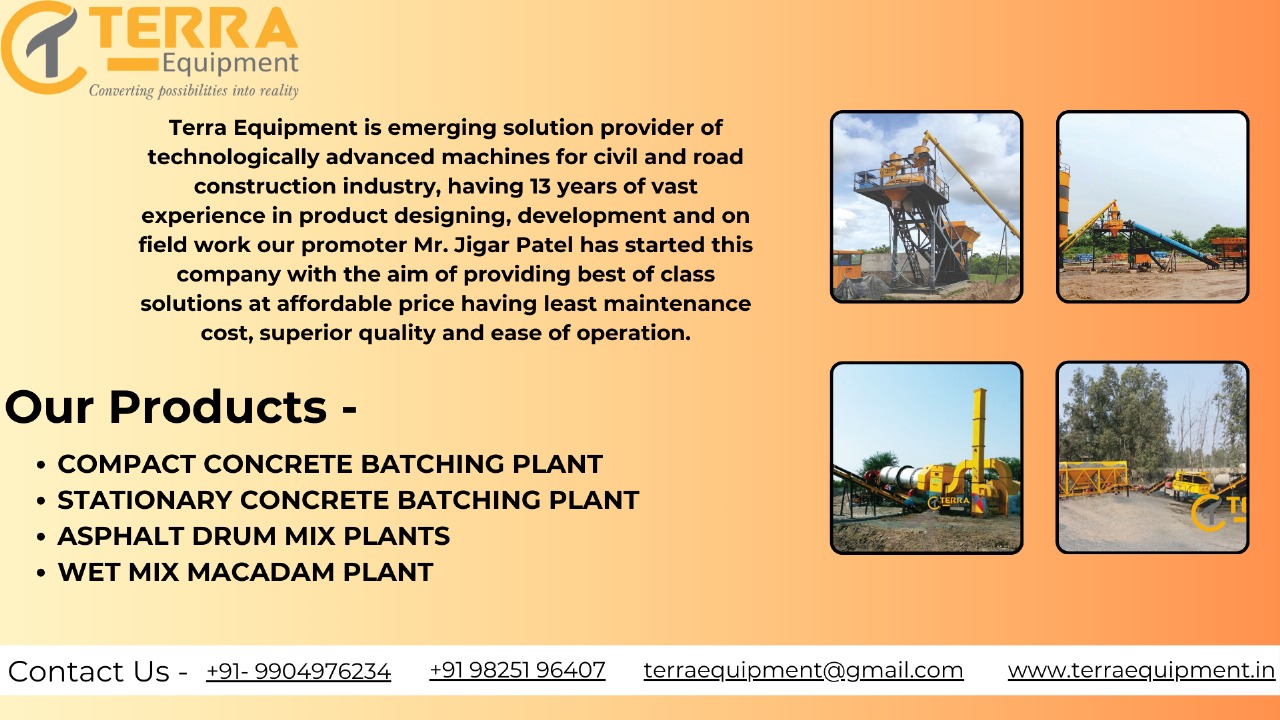RMC
(Ready-Mix Concrete) Plant
An RMC (Ready-Mix Concrete) Plant is a centralized
facility that manufactures concrete using automated equipment to combine
cement, water, aggregates, and additives in precise proportions. The mixed
concrete is then transported to the construction site in a transit mixer truck
in a ready-to-use condition. RMC plants ensure consistent quality, reduced
labor, minimal wastage, and faster construction—making them
ideal for large-scale and quality-driven construction projects.
RMC is produced under controlled conditions and adheres
strictly to IS standards or project-specific mix designs.
10
Frequently Asked Questions (FAQs)
- What
is an RMC Plant?
A Ready-Mix Concrete Plant is a facility that mixes concrete ingredients in a controlled environment and delivers it to construction sites in a ready-to-use form. - How
is it different from a site mix?
Site mix is prepared manually or by a small mixer on-site; RMC is machine-mixed, consistent, and quality-assured. - What
are the types of RMC plants?
- Dry
RMC Plant: Materials mixed in transit mixer.
- Wet
RMC Plant: Concrete is fully mixed at the plant.
- What
capacities are available?
RMC plants typically range from 30 m³/hr to 240 m³/hr. - Is
RMC more expensive than site-mixed concrete?
Initially yes, but it saves cost in labor, wastage, time, and ensures quality, making it economical in the long run. - Can
RMC be customized?
Yes, different mix designs can be prepared for various structural needs (e.g., M20, M25, M30, etc.). - Is
it suitable for all types of construction?
Yes, especially for large projects, high-rise buildings, roads, bridges, and industrial structures. - How
is quality assured in RMC?
By using computerized batching, lab testing, and strict raw material quality control. - What
are the logistics involved?
The concrete is transported using transit mixers with a limited time window (typically 90 minutes). - Is
RMC environmentally friendly?
Yes. Many plants adopt recycling systems, water treatment, and dust control measures.
Applications
- Residential buildings
- Commercial
complexes
- Dams
and irrigation projects
- Roads
and highways
- Bridges
and flyovers
- Metro
and railway projects
- Power
plants and industrial facilities
- Airports
and seaports
- Ready-made
concrete products (e.g., pipes, pavers)
Features
with Uses
|
Feature |
Use/Function |
|
Automated batching system |
|
Cement & fly ash silos |
Bulk storage and dispensing of powder materials |
|
Aggregate storage bins |
Stores coarse and fine aggregates separately |
|
Twin-shaft / planetary mixer |
Uniform, high-quality mixing |
|
Control room with software |
Operates and monitors plant processes |
|
Transit mixers |
Delivers concrete to the site |
|
Moisture sensors |
Adjust water content for consistent slump |
|
Additive dispensers |
Adds plasticizers, retarders, and other admixtures for
tailored properties |
Key
Points
- Centralized production for consistent quality
- Typically
produces M10 to M60 grade concrete
- Fully
automated and computer-controlled
- Suitable
for bulk concrete demand
- Requires
setup space, proper access roads, and raw material logistics
- Follows
IS 4926 standards (India) or relevant national standards
Handling
& Operation
- Site
Setup: Requires land with access to roads, electricity, and water.
- Batching:
Operated by trained personnel through a control system.
- Mixing:
Conducted in twin-shaft or pan mixers (wet mix) or in truck mixer (dry
mix).
- Transport:
Delivered via transit mixer; must be used within 90–120 minutes.
- Quality
Control: Continuous lab testing of raw materials and concrete cubes.
- Maintenance:
Regular cleaning, greasing, calibration, and inspection of equipment.
Benefits
- Superior and consistent concrete quality
- Reduced
material wastage and environmental impact
- Saves
time and speeds up project delivery
- Cost-effective
for large-volume concrete use
- Requires
less on-site labor and supervision
- Mix
design flexibility based on structural requirements
- Ensures
better durability and strength of structures
- Reduces
site clutter and enhances safety
Conclusion
A Ready-Mix Concrete (RMC) Plant is the backbone of
modern construction, offering precision, efficiency, and sustainability. It
minimizes human error, improves speed, and guarantees high-quality concrete
tailored to specific project needs. For medium to large construction
enterprises, setting up or sourcing from an RMC plant is an indispensable part
of the workflow—bringing consistency and competitive advantage.
Contact
Us For More Details On :-
Call :- +91 98251 96407, +91 99049 76234
Email :- terraequipment@gmail.com
Address :- Survey No- 231, Dediyasan Village, Opp Lilaba
Weigh Bridge , Mehsana -384002 Gujarat
Facebook :- www.facebook.com/people/TerraEquipment/100063801460520/?ti=as
Instagram :- www.instagram.com/terraequipment
Youtube :- www.youtube.com/c/TerraEquipmentmehsana
Website :- www. terraequipment.in

